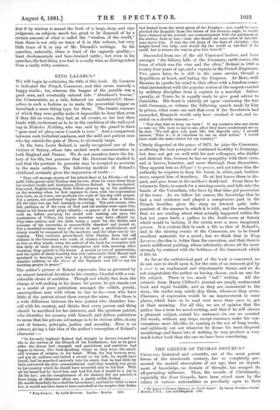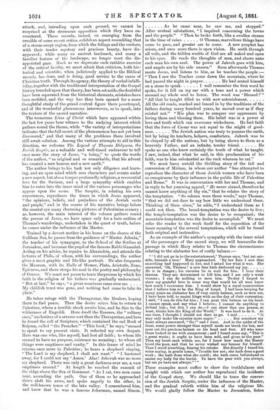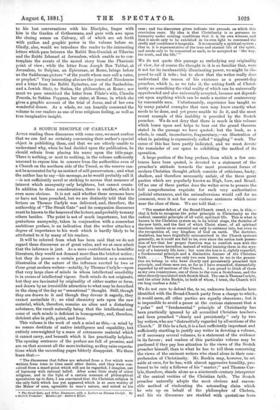THE LEGEND OF THOMAS DIDYMUS.*
CRITICISM, historical and scientific, one of the most potent forces of the nineteenth century, has so completely per- meated the mental atmosphere of our age, that no depart- ment of knowledge, no domain of thought, has escaped its all-pervading influence. Thus, the records of Christianity, especially the Four Gospels, have been seized upon by the critics of various nationalities as peculiarly open to their * The Legend of Thomas Ittelymus. the Jewish Sceptic. By James Freeman Clarke
Boston, : Leo and Shepherd. 1881.
attack, and, intruding upon such ground, we cannot be surprised at the strenuous opposition which they have en- countered. These records, indeed, on emerging from the crucible of some recent critics, exhibit an aspect resembling that of a storm-swept region, from which the foliage and the verdure, with their tender mystery and gracious beauty, have dis- appeared ; while many an ancient landmark, and many a familiar feature of the landscape, no longer meet the dis- appointed gaze. Much as we deprecate such ruthless exercise of the critical faculty, we must admit that criticism, both his- torical and scientific, when judiciously applied to the Biblical records, has done, and is doing, good service to the cause of Christian truth. Through its agency, the theory of verbal infalli- bility, together with the traditional interpretation of the Gospel history founded upon that theory, has been set aside, the doubtful have been separated from the historical elements, mistakes have been rectified, and the way has thus been opened for a more thoughtful study of the grand central figure there pourtrayed, and of the wonderful phenomena interwoven, so to speak, into the texture of the sacred narrative.
The numerous Lives of Christ which have appeared within the last few years bear witness to the undying interest which gathers round the theme, while "the variety of interpretations indicates that the full secret of the phenomenon has not yet been discovered," and that many of the problems there involved still await solution. Among the various attempts to aid in this direction, we welcome The Legend of Thomas Didgmas, the Jewish Sceptic, as a valuable and well-timed endeavour to tell once more the story of Jesus, "a being," to quote the words of the author, " so original and so remarkable, that his advent has created a new heaven and a new earth."
The author brings to his task not only diligence and learn- ing, and an open mind which sees characters and events under a new aspect, but also a temper profoundly religious, a reverential love for the Saviour, and a large sympathy which enables him to enter into the inner mind of the various personages who appear upon the scene. The Sceptic, in relating his own experiences, reproduces the times in which Jesus appeared, "the opinions, beliefs, and prejudices of the Jewish sects and people," and in the course of his narrative brings before the mental eye many charming pictures of Palestinian scenery ; as, however, the main interest of the volume gathers round the person of Jesus, we have space only for a bare outline of Thomas's wanderings, undertaken in the quest of truth, before he comes under the influence of the Master.
Trained by a devout mother in his home on the shores of the Galilean Sea, he passes from the guidance of "Master Jehuda," the teacher of his synagogue, to the School of the Scribes at Jerusalem, and becomes the pupil of the famous Rabbi Gamaliel. Acting on his advice, he repairs to Alexandria, and attends the lectures of Philo, of whom, with his surroundings, the author gives a most graphic and life-like portrait. He also frequents the Museum, with its Halls of Homer, Plato, Aristotle, Zeno, Epicurus, and there steeps his soul in the poetry and philosophy of Greece. We must not pause to trace theprocess by which his faith in the religion of his fathers was gradually undermined " But at last," he says, " a great weariness came over me My childish trust was gone, and nothing had come to take its place."
He takes refuge with the Therapeutae, the Healers, hoping there to find peace. Then the desire seizes him to return to Palestine, where a terrible shock awaits him, and he flies to the wilderness of Engeddi. Here dwell the Essenes, the " solitary ones," anchorites of a severer sort than the Therapeutae, and here he found the roll of Scripture, which contained the sad Book of Solyma, called " the Preacher." "This book," he says, "seemed to speak to my present state. It reflected my own despair. Here was one who, like myself, had lost all faith ; to whom life seemed to have no purpose, existence no meaning ; to whom all things were emptiness and vanity." In this frame of mind he returns once more to Palestine ; he hears a shepherd singing, " The Lord is my shepherd, I shall not want." " I hastened away, for I could not say ' Amen.' Alas! Jehovah was no more my shepherd. There was only a great darkness over me, a vast emptiness around." At length he reached the summit of the ridge above the Sea of Gennesar. "As I sat, two men came near, ascending the path. One of them as he approached threw aloft his arms, and spoke eagerly to the other, in the well-known tones of the lake valley. I remembered him, and knew that he was a famous fisherman, named Simon. As he came near, he saw me, and stopped."
After mutual salutations, " I inquired concerning the towns and the people." " Then he broke forth, like a swollen stream in the time of rains 0 Thomas, marvellous things have come to pass, and greater are to come. A new prophet has arisen, and once more there is open vision. He seeth through all veils, and the hidden worlds of God are all naked and open to his eyes. He reads the thoughts of men, and shows unto each man his own soul. The power of Jahveh goes with him, and angels are by his side unseen." Soon afterwards Thomas meets Jesus, and listens to him, as he teaches the people :— " Then I saw the Teacher come down the mountain, where he had passed the night in prayer He had seated himself on a stone to speak I well remember the first word he spoke, for it fell on my ear with a tone and a power which aroused my whole soul to listen. The word was Blessed I' " "All that he taught filled us with new astonishment All the old roads, marked and fenced in by the traditions of the fathers during many hundred years, he moved over as if they existed not." "His plan was to conquer our oppressors by loving them and blessing them. His belief was in a power of love and truth which can overcome wickedness. He had faith that the force of Caesar was not equal to the might of good- ness The Jewish nation was truly to possess the earth, but by being its teachers, helpers, comforters. Jahveh was to be obeyed by all the nations, but by being shown to them as a heavenly Father, and an infinite, tender friend He spoke as one who knew certainly the truth of what he taught. I saw, indeed, that what he said, in this proclamation of his faith, was to him substantial as the rock whereon he sat."
We must leave untold the thrilling story of the fall and conversion of Miriam, in whom our author " has attempted to reproduce the character of those Jewish women who have been so conspicuous by their influence in the public life of Palestine and Rome." It was in conversation with her and Thomas, and in reply to her yearning appeal, "He never sinned, therefore he cannot know anything of thy sin," that he relates the story of the temptation. " So solemn were these words," says Thomas, "that we did not dare to say how little we understood them.
Thinking of them since," he adds, " I understand them as I could not then. The bread-temptation was the desire to live ; the temple-temptation was the desire to be recognised; the mountain-temptation was the desire to accomplish." We must refer the reader to the work itself for the exposition of the inner meaning of the several temptations, which will be found both original and instructive.
As an example of the author's sympathy with the inner mind of the personages of the sacred story, we will transcribe the passage in which Mary relates to Thomas the circumstances relating to the alabaster box of costly balsam :-
"' I did not go in to the entertainment,' Thomas says, 'but sat out- side, beneath a tree.' Mary approached. By her face I saw that something had happened to her, and I asked her what it was. She answered, Oh, Thomas ! a new fear bath darkened my joy He is in danger ; his enemies lie in wait for him. I hear their threats. They are determined to kill him, and I am only a weak woman ; I can do nothing to save him. To-day I longed to show my grateful love in some way that would let all men know how much I reverence him. I would show by a royal consecration that I believe him to be the King of Israel. I had been keeping for many years an alabaster box of very costly balsam, such as men use, I have been told, to anoint kings with on the day of their coronation. I said, " I can do this for him ; I can pour this balsam on his head. I cannot speak, and say what I believe; I cannot do anything to defend him ; but this I can do,—I can show that one person, at least, thinks him the King of the World." It was hard to do it. At
one time, I thought I should not dare to go. I said ,t It may only make his enemies more angry." But somehow my
heart always answered, " Go !" and I went. And in the midst of the feast, some power stronger than myself made me break the box, and pour out the precious balsam on his head and feet. All who were there looked at me with amazement ; and I heard some say, "This is a great waste; it ought to have been sold, and given to the poor." Then my heart sank within me, for I knew how much the Master loved the poor, and that he never wished any honour for himself. Thus I stood trembling, fearing his rebuke. But directly I heard his voice saying, in gentle tones, "Trouble her not ; she bath done a good work ; she bath done what she could ; she bath come beforehand to anoint my body for the burial. Ye have the poor with you always, but me ye have not always." ' "
These examples must suffice to show the truthfulness and insight with which our author has reproduced the incidents of the Gospel story. We should like to trace the conver- sion of the Jewish Sceptic, under the influence of the Master, and the gradual rebirth within him of the religious life. We would gladly follow the Master to Jerusalem, listen to his last conversations with his Disciples, linger with him in the Garden of Gethsemane, and gaze with awe upon the closing scenes on Calvary, all of which are set forth with pathos and graphic power in the volume before us. Gladly, also, would we introduce the reader to the interesting letters which pass between the Rabbi Ben-Gumlah at Tiberias and the Rabbi Ishmael at Jerusalem, which enable us to con- template the events of the sacred story from the Pharisaic point of view ; while the letter from Joseph Ben Tabbai, at Jerusalem, to Sulpian, an Epicurean, at Rome, brings before us the Sadducean picture " of the youth whom men call a vates, or prophet." Very interesting also are the journal of Nicodemns and a letter from the Rabbi Epinetus, one of the Sanhedrim, and a Jewish Stoic, to Sotion, the philosopher, at Rome ; nor must we pass unnoticed the letter from Pilate's wife, Claudia Procula, to Sabina Poppaea, her sister, at Rome, in which she gives a graphic account of the trial of Jesus, and of her own wonderful dream. As a whole, we can heartily commend the volume to our readers as one of true religious feeling, as well as true imaginative insight.
































 Previous page
Previous page